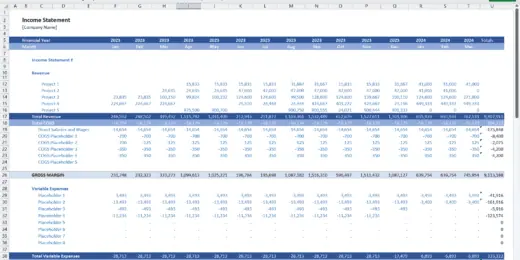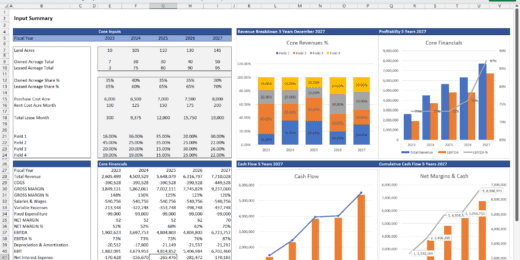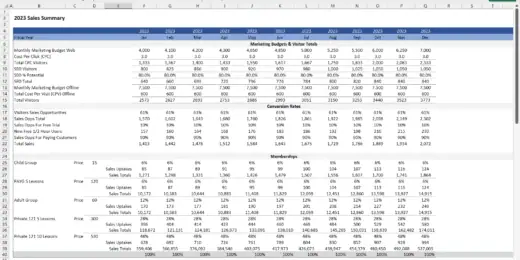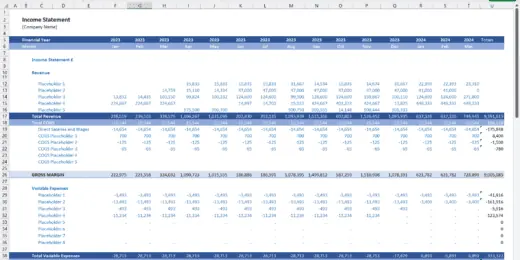Franchise Model
Start Up Company Finance Model 5 Year 3 Statement
A comprehensive editable, MS Excel spreadsheet for tracking start-up company…
5 Year 3 Statement Alpaca Farming Finance Model Excel Template
A comprehensive 3 Statement 5 Year editable, MS Excel spreadsheet…
Swimming School Finance Model Excel Template
A comprehensive editable, MS Excel spreadsheet for tracking Swimming School…
3 Statement Self Storage Company Finance Model
A comprehensive editable, MS Excel spreadsheet for tracking Self Storage…
Brewery Financial Model and Budget Control
This Excel model is an advanced, user-friendly financial planning tool…
Gym Financial Model and Budget Control
This Excel model is a highly adaptable and user-friendly tool…
Real Estate – Single Family Rental Pro-Forma Template
This real estate financial model is a dynamic tool designed…
Pet Grooming Business Dynamic Financial Model 2024
Tailored for pet grooming businesses, this dynamic financial model streamlines…
Car Wash Financial Model and Budget Control Template (Excel and Google Sheets Options)
The financial model for a car wash business is a…
Dynamic Franchise Business Plan – 3 Statement Model with DCF & Returns
Pro Forma Models created this model to analyze the financial…
All My Financial Models, Spreadsheets, Templates, and Tools: 120+
Lifetime access to all future templates as well! Here is…
Small Business Playbook (Financial / Tracking Template Bundle)
This is a set of financial models, tools, and templates…
Leverage Buyout Real Case Study Model Template
This provides an LBO (Leveraged Buyout) real case study model.
Franchisor Business – 3 Statement Model with Return Calculations & DCF
This model can be used to analyze the financial return…
Wholesale Business 3 Statement Model with Returns Calculation
This model can be used to analyze the financial return…
Franchisor Licensing: Financial Model with Cap Table / 3-Statements
Build up to a 10 year financial forecast with assumptions…
Restaurant, Take-away or Franchisee – Business Model with Three Statement Analysis – NPV, IRR, MIRR
The Restaurant Business model is also suitable for Take-away types…
Custom Financial Projection Service
Grace Cisna, the developer of all of our ProjectionHub financial…
Restaurant Financial Model: Adaptable to all Types of Outlets
Our full-fledged financial model in excel format has the functionality…
Operating Models for REAL ESTATE Agencies/Franchisees
Analyse different operating Models for Real Estate offices, agencies and…
Juice Bar- 3 Statement Financial Model with 5 years Monthly Projection and Valuation
This Juice bar FM is a perfect tool for financial…
Web/Mobile App Startup/Existing Business Financial Projection 3 Statement Model
3 statement 5 year rolling financial projection Excel model for…
Family Service Financial Model Excel Template
Get Your Family Service Financial Model. Create fully-integrated financial projection…
Hair Salon Financial Plan | Beauty Salon Business Plan
Plan out the financial plan your hair or beauty salon.…
Robotic Kiosk Franchising: Ramping and Financial Projections
Certain franchisors are building fully functional robotic kiosks to server…
Jewelry Shop / Store 5 Year Startup Business Model
A bottom-up financial model that is designed specifically for a…
Industry Based Financial Models (Variety Bundle)
There are currently 52 unique financial models included in this…
Scaling up With the Franchise Business Model

The franchise business model continues to dominate global markets today, with leading brands such as KFC, McDonald's, and Taco Bell at the forefront. These companies exemplify the strength and appeal of franchising, offering a proven business formula combined with brand recognition and established operational systems. Many entrepreneurs dream of owning a franchise due to these turnkey solutions, where much of the groundwork in branding, product development, and marketing is already established. It makes the idea of opening a franchise business model attractive, as it reduces the risks typically associated with starting a business from scratch.
However, prospective franchisees face hurdles, including high initial capital requirements, adherence to strict operational guidelines set by the franchisor, and ongoing royalties and fees. Additionally, the complexity of managing a business needs to balance local customer preferences with global brand consistency. To navigate these challenges, effective financial modeling is crucial. This strategic tool helps potential franchise owners evaluate profitability, forecast financial performance, and plan resource allocation efficiently.
Financial modeling is a wise starting point as you embark on your franchising journey. To learn more about harnessing this powerful approach in your franchise business, continue reading as we delve deeper into the mechanics and benefits of financial modeling in the franchising world.
What is the Franchise Business Model?
Franchising dates back to the Middle Ages when local landowners in China granted serfs the right to conduct business on their lands in exchange for some form of consideration. In the modern context, franchising is believed to have begun with a formal agreement in 1731 when Benjamin Franklin partnered with Thomas Whitmarsh to provide printing services in Charlestown, South Carolina. Today, the franchise business model encompasses thousands of brands and companies across numerous industries, significantly impacting the US economy and beyond.
The franchise business model is characterized by a contractual relationship between the franchisor, who owns the overarching brand, and the franchisee, who pays an initial fee and ongoing royalties to use the franchisor’s trademark, associated brand, and business model. One of the distinctive aspects of franchising is its versatility and the breadth of industries it covers, including fast food, retail, health care, and education. This model offers flexibility in business operation, expansion, and management, providing a structured yet adaptable framework for entrepreneurs to develop their businesses under an established brand umbrella. It reduces the risks associated with starting a new business and amplifies potential success through proven systems and support from the franchisor.
Partners in Progress: The Franchisor and Franchisee Relationship
Franchising becomes a strategic choice when a business aims to expand its market share or geographical footprint without significant capital outlay. This model leverages one entity's established brand and product, shared through a franchising agreement. A franchise represents a joint endeavor between two primary parties: the franchisor and the franchisee. The franchisor and franchisee relationship fosters a legal and commercial collaborative venture.
The franchisor is the cornerstone of the franchisor and franchisee relationship. As the company owner, the franchisor provides the brand, operational systems, and ongoing support. They are responsible for maintaining overall brand integrity and setting consistent standards across all franchise locations. This role includes developing marketing strategies, providing training programs, and offering continuous operational support. By empowering franchisees with the tools and guidance needed to succeed, the franchisor facilitates a network that upholds the brand's reputation and collective profitability.
Roles of a Franchisor in the Franchisor and Franchisee Relationship
- Adopt a franchise business model that franchisees can easily replicate.
- Create and maintain a consistent brand identity and standards across all franchise locations to ensure a uniform customer experience.
- Develop national and regional marketing strategies and campaigns to promote the brand and support franchisees' sales efforts.
- Ensure the franchise system complies with all relevant laws and regulations, including franchise disclosure and registration requirements.
- Give franchisees initial and ongoing training and support to help them operate their businesses effectively and comply with brand standards.
- Monitor the financial performance of franchisees to safeguard the health of the overall franchise system and assist underperforming franchisees.
- Implement and enforce quality control measures to maintain product and service standards across all franchises.
- Research and develop new products, services, and operational efficiencies to keep the franchise network competitive and relevant.

On the other side of the franchisor and franchisee relationship, the franchisee assumes the role of the local operator and ambassador of the brand. Franchisees are responsible for managing their establishments by the franchisor's stipulated practices and standards. They invest their capital and are tasked with the day-to-day operations, including hiring staff, managing finances, and executing local marketing campaigns. The franchisee's primary role is to translate the franchisor's blueprint into a profitable local business, reflecting the brand's values and ensuring customer satisfaction at the grassroots level. The franchisor and franchisee relationship aims to foster mutual success, where the growth of the individual franchise contributes to the strength and expansion of the entire brand value.
Roles of a Franchisee in the Franchisor and Franchisee Relationship
- Adhere to all the franchisor's established guidelines and standards to ensure brand consistency and compliance.
- Ensure compliance with all local, state, and federal laws and regulations affecting the franchise operations.
- Foresee the franchise's day-to-day operations, including staff, inventory, and customer service, to maintain efficiency and quality.
- Implement local marketing strategies and promotional activities in alignment with the franchisor's overall brand strategy.
- Oversee financial activities, including budgeting, accounting, and financial reporting, to ensure profitability and meet financial goals.
- Provide exceptional customer service to build and maintain customer loyalty and meet customer satisfaction benchmarks.
- Regularly report business performance and compliance issues to the franchisor as required.
- Settle all financial obligations, including initial franchise fees and ongoing royalties, and contribute to advertising funds as the franchise agreement stipulates.

Types of Franchise Businesses
The franchise business model is a widely used strategy for growing a business and distributing products and services through a licensed partnership. Different types of franchises can be broadly categorized into groups based on franchise arrangements and ownership models. These categorizations help understand how franchising can be structured to meet the franchisor's strategic goals and the franchisees' needs.
Types of Franchise Businesses According to Franchise Arrangement
- Business Format Franchise: One of the most commonly known types of franchise businesses, a business format franchise, involves the franchisor providing full services and support to the franchisee. It includes the brand name, operating systems, marketing strategies, training, and, sometimes, ongoing support. Most fast-food restaurants, retail stores, and fitness centers operate under the franchisor's trade name. They must follow specific business processes and protocols, ensuring consistency across all outlets.
- Manufacturing Format Franchise: A manufacturing franchise allows the franchisee to manufacture and sell products using the franchisor's brand name and proprietary knowledge. It is one of the most commonly known types of franchise businesses in the food and beverage industry, where the franchisee produces items to be distributed locally under the franchisor's brand. For example, soft drink bottling companies often operate as manufacturing franchises, producing and distributing the finished drink in specific geographic areas.
- Product Format Franchise: Product franchises focus on the distribution of products rather than services. Franchisees are granted the right to distribute a particular manufacturer's product. It can involve exclusive rights within a specific territory to sell certain products, like appliances, vehicles, or parts. The franchisor controls how the products are marketed and sold but only sometimes provides a full system for running the business.
Types of Franchise Businesses According to Ownership Models
- Company-Owned and Company-Operated (COCO): The franchisor owns and operates all the outlets in the COCO model types of franchise businesses. No franchisee exists; the company's employees directly manage the business locations. This model allows for tight control over operations, quality, and direct profits to the franchisor but requires significant capital and operational investment.
- Company-Owned and Franchisee-Operated (COFO): The COFO model involves franchisor-owned outlets operated by franchisees. This arrangement allows the franchisor to maintain property ownership and reap real estate benefits while franchisees handle daily operations. It strikes a balance between operational control and local management.
- Franchisee-Owned and Franchisee-Operated (FOFO): In the FOFO model, the franchisee owns and operates the business independently. The franchisor provides the brand and the system, but the franchisee invests in the property and manages the outlet. It is one of the most common types of franchise businesses and is appealing to entrepreneurs who wish to operate their own businesses while benefiting from a more prominent brand's support.
- Franchisee-Owned and Company-Operated (FOCO): Lastly, the FOCO model sees the franchisee owning the outlet while the company manages its day-to-day operations. This can benefit franchisees who want to invest in the brand but want to avoid working the business operations themselves. It allows them to benefit financially from the investment while leveraging the franchisor's expertise to manage the outlet.
Each franchise type offers distinct advantages and fits different strategic objectives depending on the franchisor's specific needs and the franchisees' capabilities and interests.

How Does a Business Franchise Work?
How does a business franchise work? It allows an individual or group to use the business systems, brand name, and products or services of an established company, known as the franchisor.
How does a business franchise work? It enables the franchisee to operate a business under a recognized brand with support from the giant corporation. At the same time, the franchisor expands its market presence and brand without having to manage and finance new locations.
Here's a breakdown of how does a business franchise work:
- Franchise Agreement: The relationship begins with a franchise agreement, a legal contract that outlines the franchisor's and franchisee's rights and responsibilities. It includes the duration of the franchise, fees to be paid, and the standards and procedures the franchisee must follow.
- Initial and Ongoing Fees: Franchisees typically pay an initial franchise fee to start their business under the franchisor's brand. Additionally, franchisees usually pay ongoing royalties, which are a percentage of their revenue. These fees fund support services provided by the franchisor and contribute to the brand's overall marketing.
- Training and Support: The franchisor provides the franchisee with training and support, including assistance in site selection, store design, operational systems, and initial employee training. This support continues throughout the franchise agreement to ensure consistency and quality across all locations.
- Marketing and Branding: Franchisors undertake and manage broad marketing efforts that benefit all franchise locations, such as national advertising campaigns and promotional strategies. Franchisees benefit from established brand recognition and reputation, which can attract customers more effectively than a new, untested business could.
- Supply Chain Management: Franchisors often supply products, ingredients, or proprietary items necessary to operate the business. This ensures uniformity in product quality and helps negotiate bulk purchase discounts, reducing franchisees' costs.
- Expansion and Scale: Franchisors expand their market presence through franchising without the high capital costs of opening new locations. It allows for faster scaling and access to diverse markets through local operators who understand the area.
How does a business franchise work and make money? A franchisor's revenue streams can be as follows:
- Franchise Fees: Income from selling franchise rights.
- Marketing Funds: Contributions from franchisees for collective marketing efforts.
- Royalties: Ongoing revenue from franchisees' sales, typically 4% to 12%.
- Supply Chain Profits: Earnings from selling products to franchisees.
On the other hand, franchisees benefit from higher profit margins due to the established systems and processes, which can reduce the likelihood of business failure compared to independent startups. The franchisor's success is tied to the franchisees' success, motivating ongoing support and innovation.

Franchise Business Plan Sample: A Strategic Blueprint for Franchise Growth
While the franchise business model can be a powerful way to expand and generate profits, it also involves challenges such as maintaining quality control across multiple locations, managing relationships with franchisees, and legal complexities related to franchise agreements. Overall, franchising is a symbiotic business model where both franchisors and franchisees have the potential to make significant profits through a structured and supportive business environment.
A well-crafted franchise business plan sample is a strategic blueprint vital for fostering franchise growth. It systematically outlines every aspect of the franchise operation—from initial fees, training, and support to marketing, sales, and supply chain logistics—ensuring that both franchisor and franchisee have clear guidelines and resources. Our franchise business plan sample helps maintain brand consistency and operational efficiency across various locations and allows franchisees to navigate the business environment's complexities. By setting a solid foundation with a comprehensive franchise business plan sample, franchisees are better equipped to achieve sustainable growth, adapt to market changes, and create a mutually profitable environment that benefits all parties involved in the franchise system.





































